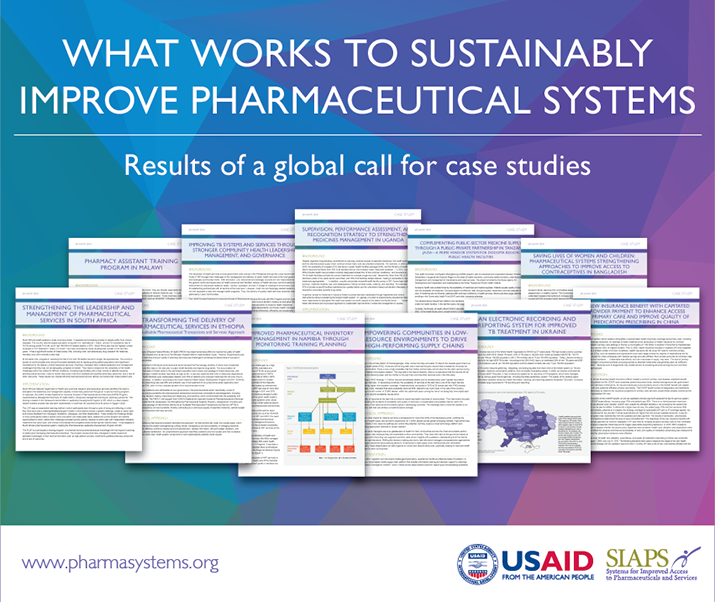New Collection of Case Studies Explores Most Promising Interventions to Strengthen Pharmaceutical Systems
New Collection of Case Studies Explores Most Promising Interventions to Strengthen Pharmaceutical Systems

Arlington, VA—February 6, 2018—A new compendium released today by the USAID-funded Systems for Improved Access to Pharmaceuticals and Services (SIAPS) Program, implemented by Management Sciences for Health, offers an in-depth look at 12 innovative and promising efforts to strengthen pharmaceutical systems. Case Studies in Pharmaceutical Systems Strengthening documents the lasting effect of interventions on the people, processes, and structures that comprise a pharmaceutical system and includes actionable lessons and recommendations.
“Based on decades of experience, the global health community knows that systemic approaches are the best way to ensure that progress in strengthening pharmaceutical systems is both effective and sustainable, said Francis Aboagye-Nyame, SIAPS program director. “The case studies in this collection are great examples of that principle in action, and showcase exciting, innovative approaches.”
The global call was open to all stakeholders, including donors, the private sector, governments, universities, and implementing agencies. Its purpose was to provide examples of interventions that strengthened and sustained responsive and resilient pharmaceutical systems, inviting commentary and offering lessons learned. The published studies were selected from 46 entries representing work in more than 25 countries. Reviewers at the Harvard Pilgrim Health Care Institute and Harvard T.H. Chan School of Public Health independently assessed eligible case studies.
The featured projects include:
- A set of interventions, Auditable Pharmaceutical Transactions and Services (APTS), that contributes to a continuous supply of essential medicines in Ethiopia.
- A supervision, performance assessment, and recognition strategy (SPARS) program in Uganda to improve medicines management;
- A cloud-based mobile supply chain platform to help ensure vaccines availability at last-mile health centers in India;
- A benefit fund in Zhuhai, People’s Republic of China, that promotes access to primary care; and
- A public-private partnership establishing a prime vendor system for public health facilities in Tanzania.
About SIAPS
Funded by the United States Agency for International Development, the Systems for Improved Access to Pharmaceuticals and Services (SIAPS) Program works in 46 countries to assure the availability of quality pharmaceutical products and effective pharmaceutical services to achieve desired health outcomes. Toward this end, the SIAPS result areas include improving governance, building capacity for pharmaceutical management and services, addressing information needed for decision-making in the pharmaceutical sector, strengthening financing strategies and mechanisms to improve access to medicines, and increasing quality pharmaceutical services. For more information, visit: www.siapsprogram.org.
About MSH
Management Sciences for Health (MSH) works shoulder-to-shoulder with countries and communities to save lives and improve the health of the world’s poorest and most vulnerable people by building strong, resilient, sustainable health systems. Together, we seek to achieve universal health coverage—equitable, affordable access to high-quality health services for all who need them—even in fragile, post-crisis settings. For more than 45 years in 150 countries, MSH has partnered with governments, civil society, the private sector, and thousands of health workers on locally-led solutions that expand access to medicines and services, improve quality of care, help prevent and control epidemics, support inspiring leadership and transparent governance, and foster informed, empowered, and healthier communities. For more information, visit www.msh.org.